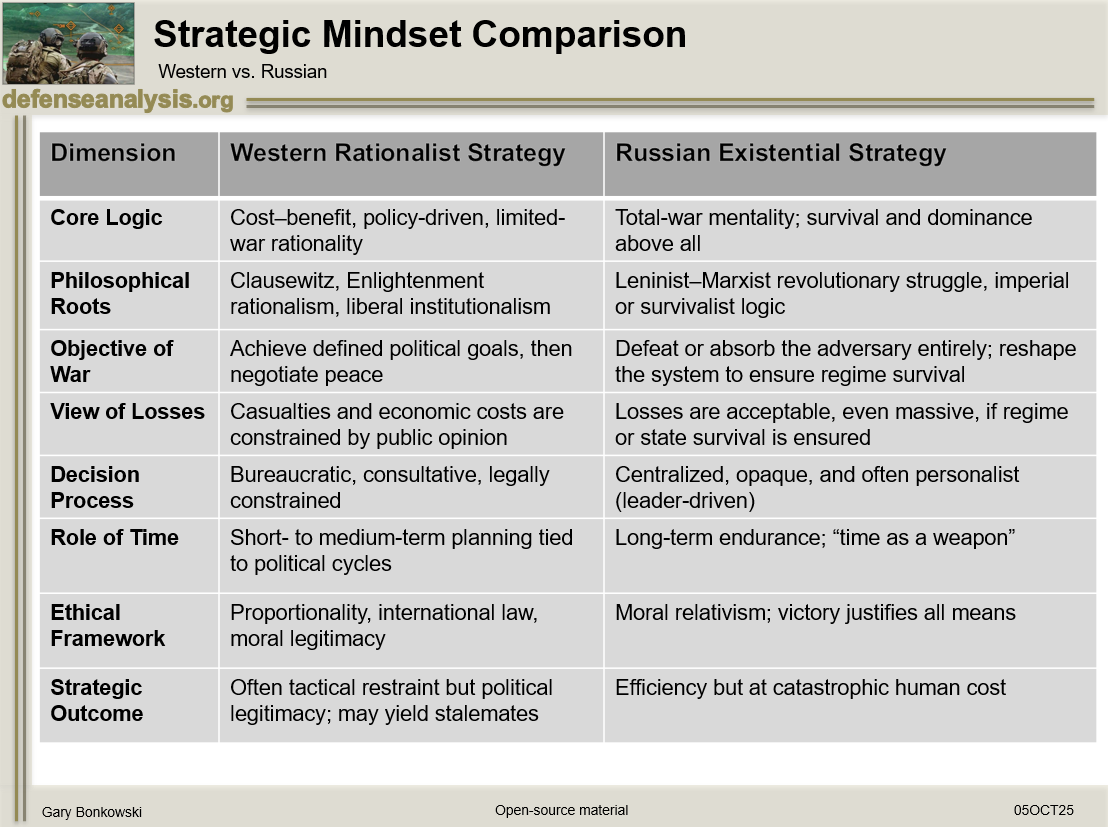Russian Mindset vs Western
Throughout modern military history, Russian leaders have had a distinct edge on Western leaders in their ability to employ strategic imagination in all aspects of their decision making. Western democratic leaders are limited by public opinion, law and bureaucratic constraints which stifle bold leadership actions. By contrast, autocratic systems allow leaders to act decisively without public consensus or government compromise, thus enabling leaders like Putin and Stalin to execute bold strategies.
I am not advocating for autocratic systems and certainly not for Putin or Stalin, both of whom have led two of the most brutal regimes in human history. Putin’s campaign to retake Ukraine has brought about a horrific three-and-a-half-year war costing hundreds of thousands of lives while Stalin’s regime led to the death of 15-20 million of his own citizens.
The intent of this brief analysis is to better understand how and why Russia seems to continually achieve strategic wins. Their wins aren’t immediately evident as they are always achieved through attritional warfare.
Attritional warfare involves wearing an enemy down over an extended period of time by inflicting sustained losses in personnel, equipment and resources. Attritional warfare does not involve large scale victories or dramatic wins, but a slow but continual wearing down of the enemy. Russian leaders continually demonstrate that they can achieve strategic victory through the use of attritional warfare. This has been most recently exemplified by Putin with his long-term preparation for the conflict in Ukraine. This preparation dates back to 2014 with the annexation of Crimea and early entry into the Donbass region. Putin has executed operational patience with their current campaign on the Eastern front, despite diversionary tactics, like Ukraine’s counteroffensive in the Kursk Oblast, Putin kept his eye on the ball. Ukraine’s tactic was hopefully desperate, and unfortunately, it didn’t work. They had hoped that Putin would shift troops from the Eastern front to defend the second front opened up in Kursk, that didn’t happen. Instead, Russian ground forces maintained their numbers on the Eastern front and persist to date with a slow but steady push Westward.
The particular strategic mindset that Putin embodies is one that is rooted in a willingness to absorb pain, accept losses and be indifferent to public opinion in order to achieve a strategic payoff. Russian leaders have historically weaponized disinformation, used propaganda and nuclear brinkmanship in ways that Western leaders would consider politically impossible. Unfortunately, Putin knows very well how to employ these systems to Russia’s full benefit, and he also understands the fundamentals of strategic sequencing.
Any cursory review of World War II history reveals how Stalin also thought in terms of sacrifice, risk and absorbing loss to achieve strategic payoff. Stalin was a ruthless disciplinarian, under order 227, Russian Soldiers that retreated were immediately shot by their commanding officer. Such an order would have never been issued by a Western leader or commander, but it actually worked to stiffen Soviet resolve in the early years of the War. Stalin allowed German supply lines to extend deep into Russia’s interior to exhaust German logistics capacity, a strategy that worked brilliantly but only because of his strategic patience was it successful. Most notably but also horrific was Stalin’s willingness to absorb 20 million Soviet deaths to achieve victory. He understood that by allowing this, he could revive Russian nationalism and rally the masses, he even named WWII, the Great Patriotic War. The deaths meant nothing to him, victory as the end state was the only thing that mattered as he had achieved victory but in a brutal manner.
This is a fundamental aspect of Russian leadership that has been forgotten by Western analysts, Russian leaders are willing to risk everything to achieve victory. They don’t live in the “cost-benefit analysis” paradigm that us Westerners do, they operate by an entirely different calculus. Western leaders and Westerners in general think in a utilitarian mindset that is every action has measurable consequences that can be optimized. We apply proportionality, a legal and ethical principle meaning that military force is applied proportionally to achieve the established objectives. This mindset emphasizes a measured escalation that preserves legitimacy and avoids excessive deaths, especially civilian casualties. Traditionally in the West, war is seen as an instrument of policy, this Clausewitzian Calculus establishes war as a continuation of policy by other means. This means that losses must be justified by measurable, politically attainable results. This also would mean that wars are terminated once political objectives have been achieved or when costs exceed the perceived benefits. The wars in Vietnam, Iraq and Afghanistan are poor examples of this calculus, but their terminations were in fact due to political pressure, casualty sensitivity and media transparency. Generally speaking, Western Leaders think in terms of optimization: “What is the least costly way to secure national interests within legal and moral boundaries?
The fundamental differences in strategic mindset can be best represented in a chart that explains the differences through the dimensions of mindset.
